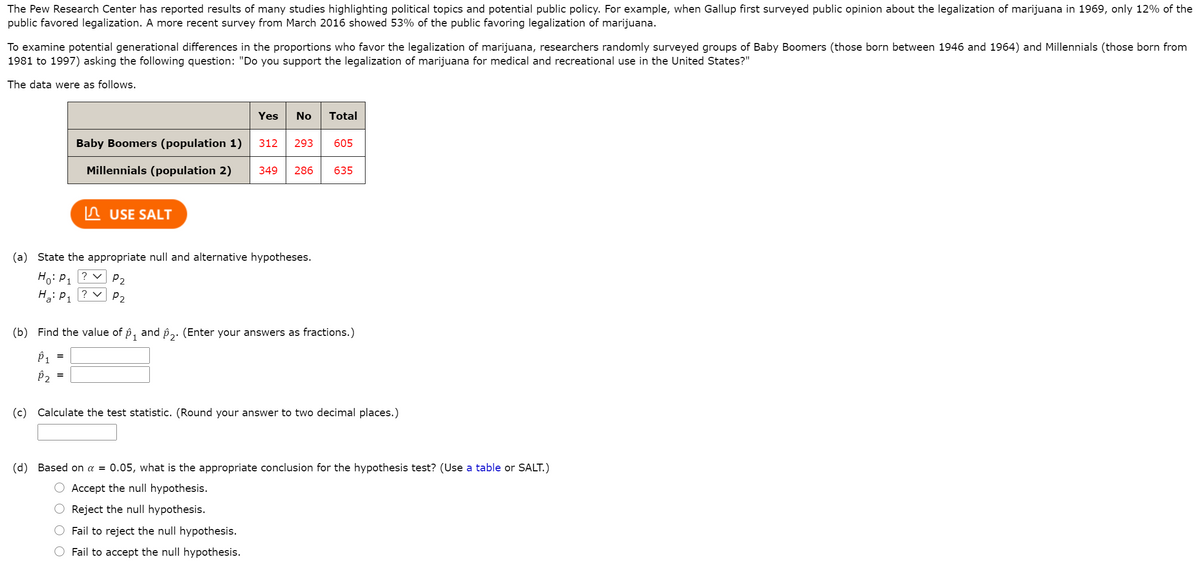he Pew Research Center has reported results of many studies highlighting political topics and potential public policy. For example, when Gallup first surveyed public opinion about the legalization of marijuana in 1969, only 12% of the public favored legalization. A more recent survey from March 2016 showed 53% of the public favoring legalization of marijuana. To examine potential generational differences in the proportions who favor the legalization of marijuana, researchers randomly surveyed groups of Baby Boomers (those born between 1946 and 1964) and Millennials (those born from 1981 to 1997) asking the following question: "Do you support the legalization of marijuana for medical and recreational use in the United States?" The data were as follows. Yes No Total Baby Boomers (population 1) 312 293 605 Millennials (population 2) 349 286 635
he Pew Research Center has reported results of many studies highlighting political topics and potential public policy. For example, when Gallup first surveyed public opinion about the legalization of marijuana in 1969, only 12% of the public favored legalization. A more recent survey from March 2016 showed 53% of the public favoring legalization of marijuana. To examine potential generational differences in the proportions who favor the legalization of marijuana, researchers randomly surveyed groups of Baby Boomers (those born between 1946 and 1964) and Millennials (those born from 1981 to 1997) asking the following question: "Do you support the legalization of marijuana for medical and recreational use in the United States?" The data were as follows. Yes No Total Baby Boomers (population 1) 312 293 605 Millennials (population 2) 349 286 635
Holt Mcdougal Larson Pre-algebra: Student Edition 2012
1st Edition
ISBN:9780547587776
Author:HOLT MCDOUGAL
Publisher:HOLT MCDOUGAL
Chapter11: Data Analysis And Probability
Section: Chapter Questions
Problem 8CR
Related questions
Topic Video
Question
The Pew Research Center has reported results of many studies highlighting political topics and potential public policy. For example, when Gallup first surveyed public opinion about the legalization of marijuana in 1969, only 12% of the public favored legalization. A more recent survey from March 2016 showed 53% of the public favoring legalization of marijuana.
To examine potential generational differences in the proportions who favor the legalization of marijuana, researchers randomly surveyed groups of Baby Boomers (those born between 1946 and 1964) and Millennials (those born from 1981 to 1997) asking the following question: "Do you support the legalization of marijuana for medical and recreational use in the United States?"
The data were as follows.
| Yes | No | Total | |
|---|---|---|---|
| Baby Boomers (population 1) | 312 | 293 | 605 |
| Millennials (population 2) | 349 | 286 | 635 |
(a)
State the appropriate null and alternative hypotheses.
H0: p1
? < = > ≠
p2
Ha: p1
? < = > ≠
p2
(b)
Find the value of p̂1 and p̂2. (Enter your answers as fractions.)
p̂1
=
p̂2
=(c)
Calculate the test statistic. (Round your answer to two decimal places.)
(d)
Based on
? = 0.05,
what is the appropriate conclusion for the hypothesis test? (Use a table or SALT.)Accept the null hypothesis.Reject the null hypothesis. Fail to reject the null hypothesis.Fail to accept the null hypothesis.

Transcribed Image Text:The Pew Research Center has reported results of many studies highlighting political topics and potential public policy. For example, when Gallup first surveyed public opinion about the legalization of marijuana in 1969, only 12% of the
public favored legalization. A more recent survey from March 2016 showed 53% of the public favoring legalization of marijuana.
To examine potential generational differences in the proportions who favor the legalization of marijuana, researchers randomly surveyed groups of Baby Boomers (those born between 1946 and 1964) and Millennials (those born from
1981 to 1997) asking the following question: "Do you support the legalization of marijuana for medical and recreational use in the United States?"
The data were as follows.
Yes
No
Total
Baby Boomers (population 1)
312
293
605
Millennials (population 2)
349
286
635
In USE SALT
(a) State the appropriate null and alternative hypotheses.
Ho: P, ? v
P2
? V
P2
(b) Find the value of p, and p,. (Enter your answers as fractions.)
1
P 1
P2
%D
(c) Calculate the test statistic. (Round your answer to two decimal places.)
(d) Based on a = 0.05, what is the appropriate conclusion for the hypothesis test? (Use a table or SALT.)
Accept the null hypothesis.
Reject the null hypothesis.
Fail to reject the null hypothesis.
O Fail to accept the null hypothesis.
O O
Expert Solution
This question has been solved!
Explore an expertly crafted, step-by-step solution for a thorough understanding of key concepts.
This is a popular solution!
Trending now
This is a popular solution!
Step by step
Solved in 4 steps

Knowledge Booster
Learn more about
Need a deep-dive on the concept behind this application? Look no further. Learn more about this topic, statistics and related others by exploring similar questions and additional content below.Recommended textbooks for you

Holt Mcdougal Larson Pre-algebra: Student Edition…
Algebra
ISBN:
9780547587776
Author:
HOLT MCDOUGAL
Publisher:
HOLT MCDOUGAL

Glencoe Algebra 1, Student Edition, 9780079039897…
Algebra
ISBN:
9780079039897
Author:
Carter
Publisher:
McGraw Hill

College Algebra (MindTap Course List)
Algebra
ISBN:
9781305652231
Author:
R. David Gustafson, Jeff Hughes
Publisher:
Cengage Learning

Holt Mcdougal Larson Pre-algebra: Student Edition…
Algebra
ISBN:
9780547587776
Author:
HOLT MCDOUGAL
Publisher:
HOLT MCDOUGAL

Glencoe Algebra 1, Student Edition, 9780079039897…
Algebra
ISBN:
9780079039897
Author:
Carter
Publisher:
McGraw Hill

College Algebra (MindTap Course List)
Algebra
ISBN:
9781305652231
Author:
R. David Gustafson, Jeff Hughes
Publisher:
Cengage Learning
